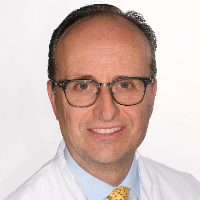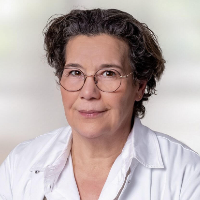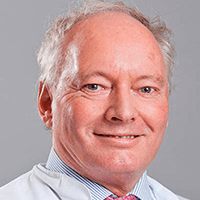Diagnostic of Skin Cancer
Treatment prices are regulated by national law of the corresponding countries, but can also include additional hospital coefficients. In order to receive the individual cost calculation, please send us the request and medical records.

Department of Adult and Pediatric Dermatology, Allergology and Phlebology
The Department of Adult and Pediatric Dermatology, Allergology and Phlebology offers all the options of modern medicine for diagnosing and treating skin diseases, allergies, and venereal pathologies. The focus of the department's dermatologists is on patients with various types of skin cancer, psoriasis, eczema, neurodermatitis, acne, venous diseases, and chronic non-healing leg ulcers. The medical facility also admits young patients, including those with rare and genetic skin diseases. The department has an excellent technical base, thanks to which modern laser treatment, light therapy, phototherapy, and advanced sparing surgical interventions are successfully performed here. Top-class medical care is provided by a highly professional team of 60 specialized doctors and 130 nurses, as well as medical and technical workers. About 90,000 patients undergo outpatient treatment, and more than 5,800 patients receive medical care on an inpatient basis annually. The hospital has 160 beds to accommodate patients. The department is thus one of the largest medical facilities of this kind in Germany.






Department of Dermatology and Allergology
The Department of Dermatology and Allergology provides all diagnostic tests and therapeutic measures for the treatment of skin diseases and allergic reactions. The priority area of the department's work is the treatment of malignant skin neoplasms (certification as a Skin Cancer Center of the German Cancer Society). Each patient receives an individual treatment regimen for skin pathology or allergies, which includes the most effective and sparing therapeutic methods.




Department of Dermatology, Venereology and Allergology
The Department of Dermatology, Venereology and Allergology offers the diagnostics and treatment of all dermatological diseases. The department specializes in the very latest methods of surgical dermatology, diagnostics and treatment of skin cancer, venous diseases, as well as all diagnostic and therapeutic methods of modern dermatology, including laser dermatological therapy, phototherapy, photodynamic therapy, etc. The treatment of patients with skin cancer is carried out in close cooperation with colleagues from the University Cancer Center Frankfurt.






Most types of skin cancer are relatively favorable. People die from this disease less and less, since skin tumors are in plain view and can be detected on time. To successfully get rid of the disease, it should be timely diagnosed. This can be done in the best clinics in the world.
Early diagnostics
The signs of skin cancer appear early and can be clearly visible upon closer examination. Therefore, most cases can be detected in the early stages and successfully cured. To timely detect skin cancer, one should:
- Perform self-diagnostics.
- In case of detection of suspicious formations, consult a doctor to undergo the professional diagnostics.
You should inspect your skin 1 time per month. Regular examinations will allow you to understand what formations on the body already exist, what size they have, what new ones appeared, how existing ones have changed. Self-examinations are especially important for people at risk:
- large number of moles on the body;
- frequent or severe insolation (tanning);
- burdened heredity (cases of skin cancer in the family);
- weak immunity or use of immunosuppressants.
You only need your own eyes and a mirror. Someone close to you will help examine your skin in places that are difficult to access for self-examination. Do not forget to examine the following areas of the skin:
- under the breast;
- armpits;
- between fingers;
- under the nails;
- behind the ears;
- in the folds of the anogenital zone;
- on the scalp.
Symptoms
It is quite obvious where to look for, but you should also understand what to look for. Skin cancer mostly develops in the area affected by sunlight. The main signs of a malignant tumor include:
- a new spot or bulge on the skin, its growth in dynamics (the spot became larger when re-examined after 1 month);
- a bleeding wound, especially if it does not heal for weeks;
- a rough spot with scales that crusts over;
- vegetation (warty growths);
- change in size, shape, asymmetry of an existing mole, its uneven color, fuzzy borders.
Basal cell skin cancer can have the following manifestations:
- a flat yellow formation resembling a scar;
- a red and itchy spot that rises above the level of the skin;
- unevenly colored plaques with uneven relief;
- pink vegetations having a branched network of vessels inside;
- open ulcers that do not heal, or ulcerate again after healing.
Squamous cell carcinoma may look similar. Another option is the formation of grouped nodules that merge. They have a higher level relative to the skin surface on the periphery than in the center.
Diagnosis confirmation
A doctor examines a suspicious formation and evaluates the symptoms. If he considers the skin changes to be those that show signs of a malignant tumor, he will decide to perform a biopsy. The procedure involves a total or partial removal of the neoplasm, or obtaining a fragment of it with a needle. Once the material is examined, the laboratory will give a conclusion whether it is cancer or not.
Biopsy options:
- tangential biopsy – the doctor shaves off a thin layer of the upper part of the tumor (after the procedure, the doctor will stop bleeding with a laser or electrocoagulation);
- trephine biopsy – a thick needle is inserted into the neoplasm and rotated, after which it is removed, whereas a column of tissue remains inside;
- incisional biopsy – it can almost never be used for skin cancer. The tumor is resected (partially removed), while the fragment is sent for histological examination;
- excisional biopsy – it involves removal of the entire tumor before the establishment of final diagnosis, and later it will be examined.
With the exception of melanoma, skin cancer can rarely spread metastasis. Nonetheless, this can sometimes happen in advanced cases. Should the lymph nodes near the tumor be enlarged, the doctor may decide to conduct a sentinel lymph node biopsy. This is the first node, to which lymph flows from the area of the neoplasm.
A lymph node biopsy can be performed using one of two options:
- fine needle aspiration involves the insertion of the needle, after which there will be created a negative local pressure in the aspirator (the procedure resembles a blood sampling from a vein);
- excisional biopsy can be used if the node is located close to the surface of the skin, or with a negative aspiration biopsy, when the doctor still has doubts.
As a rule, skin tumors can be detected in the early stages and immediately removed using cryosurgery, electrocoagulation or conventional surgery. The pathology can progress to stage 3-4 very rarely. In these cases, the problem area can be examined using CT or MRI scan to clarify the shape, size of the tumor, detect all metastatic foci.
Where to go for diagnostics?
You can undergo skin cancer diagnostics using modern methods in the best clinics in the world. Should the diagnosis be confirmed, the tumor can be immediately removed using a laser, cryosurgery or conventional surgical resection. To undergo diagnostics and treatment of skin cancer, please contact the Booking Health company. We will arrange a trip abroad for you to receive the highest level of medical services. You will get the following benefits:
- Selection of the best center for the diagnostics and treatment of skin cancer, based on the statistics of a medical institution for this disease (percentage of patients cured, risk of complications, etc.).
- Reduced costs of diagnostics and surgery due to the lack of additional coefficients and overpricing for foreign patients.
- Appointment with a doctor on the most suitable dates for you.
- Preparation of the program taking into account previously performed studies.
- Establishment of communication directly with the attending physician.
- Monitoring of all stages of the diagnostic and treatment program.
- Control of invoicess, return of unspent funds.
- Buying and forwarding of medicines.
- Organization of additional diagnostic or therapeutic procedures.
- Communication with the clinic upon treatment completion.
The Booking Health will provide you with top-class service. We will book a hotel, buy airline tickets, help complete the necessary paperwork. You will be met at the airport and taken to the clinic by car. Once you undergo the diagnostics, you will be taken back to the airport.

